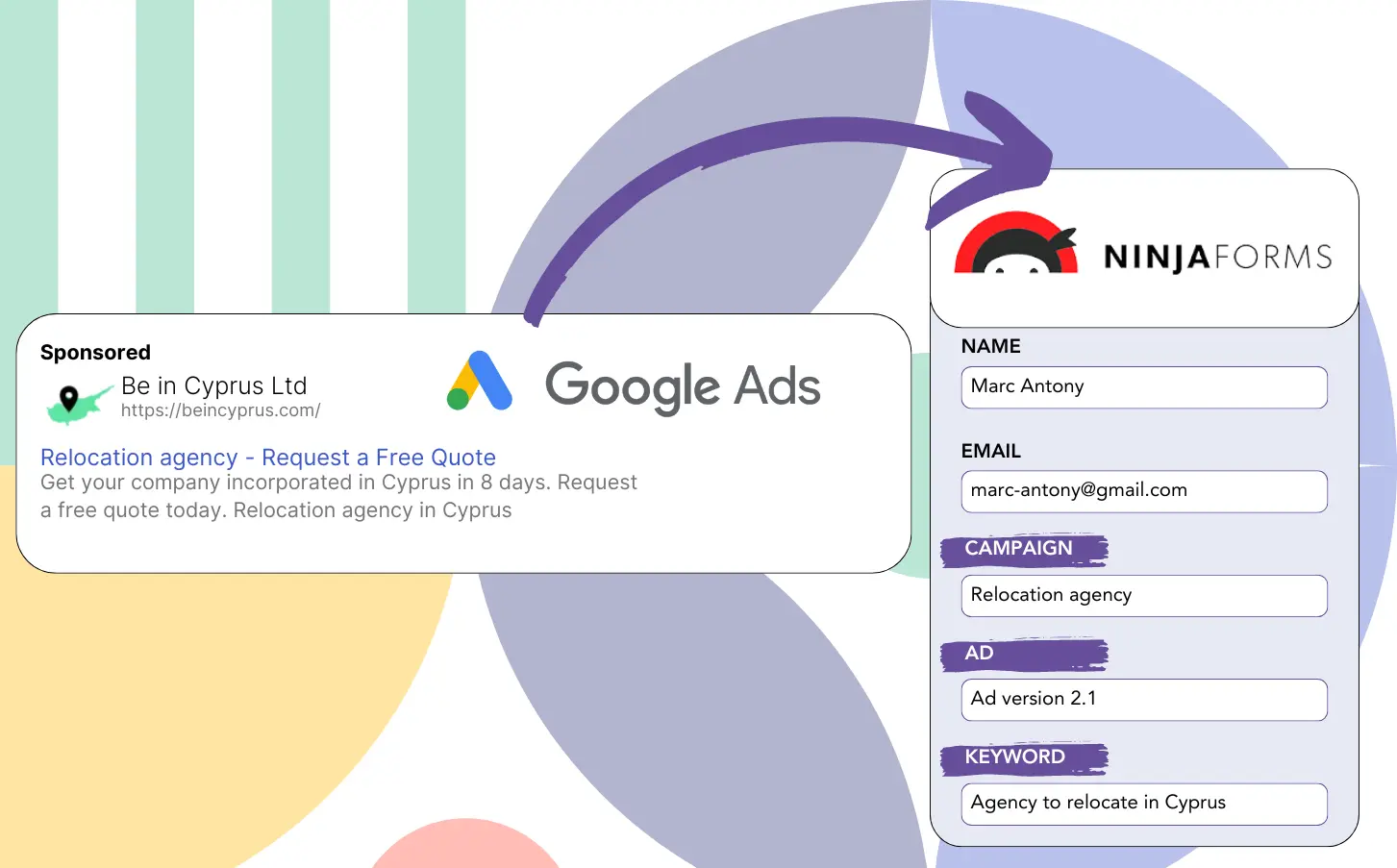Are you having trouble identifying the source campaigns of your leads in Google Ads?
It’s a well-known issue that Google Ads provides lead counts by campaign, ad, or keyword but doesn’t offer data at the individual lead level.
Therefore, you are unable to trace which campaign, ad, or keyword led to the conversion of leads into customers.
Leadsources resolves this challenge.
Leadsources allows you to monitor your Google Ads data by campaign, ad, and keyword on a lead-by-lead basis.
You can then capture Google Ads data, such as campaign, ad, and keyword, for each lead in Ninja Forms.
You can create reports like “Keywords that generated the most leads” and make decisions on promoting or canceling keywords.
Let’s jump in!
Capture Google Ads lead data in Ninja Forms in 4 steps
Step 1: Add Leadsources in the head tag of your website
Sign up to Leadsources.io, and benefit from our 14-day free trial.
Add the Leadsources code to your website’s head tag. No coding experience is necessary.
Simply follow this easy step-by-step guide.
Step 2: Add the UTM parameters to your Google Ads campaigns
Include the UTM parameters you want to monitor in all your Google Ads campaigns.
You can use the following UTM parameters in your ad:
- UTM_source
- UTM_campaign
- UTM_term
- UTM_content
Leadsources captures extra information beyond UTM parameters, including channel, landing page, and landing page subfolder, for a complete lead-level perspective.
Step 3: Add the hidden fields in Ninja Forms
Leadsources auto fills hidden fields in your Ninja Forms with Google Ads data (campaign, ad, keyword, landing page, etc.) as visitors complete them (name, email, etc.).
For this process, use these step-by-step instructions to include hidden fields in Ninja Forms.
Leadsources will store the Google Ads information directly in your Ninja Forms.
Step 4: Capture the Google Ads data in Ninja Forms
As a visitor clicks on your Google Ads ad and lands on your page, Leadsources captures the relevant Google Ads data (campaign, ad, keyword, landing page, etc.).
Leadsources fills the hidden fields of your Ninja Forms with Google Ads data automatically.
Upon submission of the form, both the Google Ads data and the form responses are directed to the Ninja Forms submissions page.
How does Leadsources work?
When you add the Leadsources code to your website’s head tag, it will capture Google Ads data, including UTM parameters and referrer, on each visit.
Leadsources will store the captured Google Ads data in the hidden fields of your Ninja Forms.
When visitors come to your site without UTM parameters, Leadsources will capture their data using the referrer:
- Channel
- Source
- Campaign
- Landing page
- Landing page subfolder
With this technique, you can monitor important lead source data even without UTM parameters, including:
- On Google Search
- On your Instagram bio link
- On your social media posts
- Etc.
Most tools track lead information solely when UTM parameters are applied, which is mainly for paid and referral sources which can be problematic.
Leadsources can collect lead data for every channel, even when UTM parameters are not present:
- Organic Search
- Paid Search
- Organic Social
- Paid Social
- Referral
- Affiliate
- Display Advertising
- Direct Traffic
This allows you to collect and centralize all lead source data in one place.
Pro tip:
Track Google Ads data in all the popular online form builders, including Cognito Forms, Gravity Forms, Jotform, Typeform, WPForms, and more. Learn how to add Google Ads UTM parameters in any form builder.
How to run performance reports
With your Google Ads information in Ninja Forms, you can produce performance reports such as:
- Leads per campaign
- Leads per ad
- Leads per keyword
- Etc.
This assists you in making knowledgeable decisions regarding your Google Ads expenses.
We will now explore the range of reports you can produce.
Lead performance reports
You have the option to create reports illustrating the number of leads generated by:
- Channel
- Campaign
- Ad
- Keyword
- Landing page
- Landing page subfolder
Example #1
Export data from various campaigns (SEO, PPC, email, etc.) to create a report called “Leads by Channel.”
Example #2
After finding out which channel yields the most leads (e.g., Google Ads), you can filter by that channel to review lead counts for each individual ad campaign.
Example #3
After determining which campaign produces the most leads, you can investigate which specific keywords are generating them.
Sales performance report
While finding the top ads and keywords for lead generation is important, but do they also lead to higher revenue?
Integrating Ninja Forms submissions with a CRM enables you to generate insightful sales reports.
Example:
| Channels | Search Paid | Social Paid |
| Leads | 50 | 75 |
| Sales | 5 | 6 |
| Average order value | $150 | $100 |
| Revenue | $750 | $600 |
Following your ad campaigns on Google and Facebook, you found that Social Paid ads produced a greater number of leads than Search Paid ads.
After a few weeks, you discovered that Search Paid campaigns generated more revenue with fewer leads than Social Paid campaigns, leading you to decide on a higher budget for Search Paid ads.
LeadSources tracks the source of each lead in Ninja Forms, whether they come from ads, organic search, social, email, etc. and syncs that data with each submission. See the full breakdown on the lead source in Ninja Forms page.
